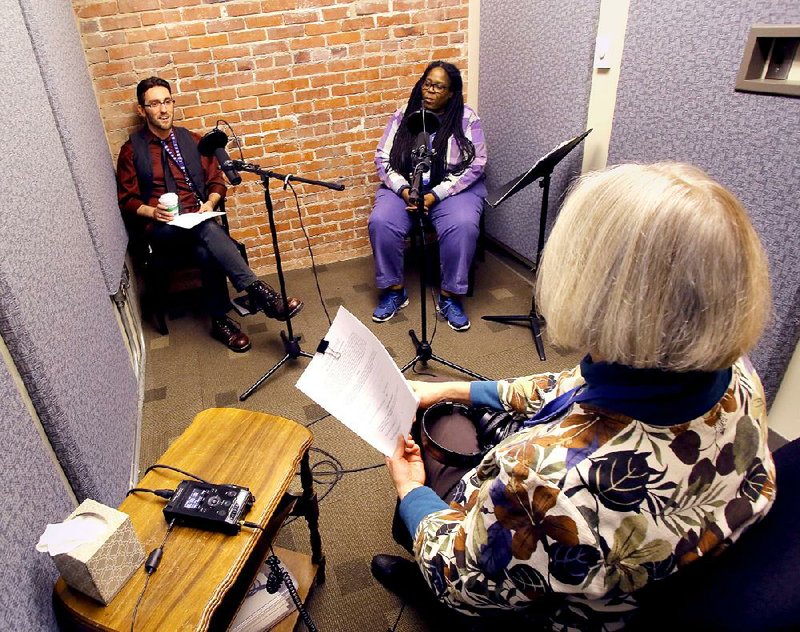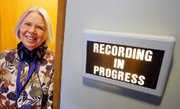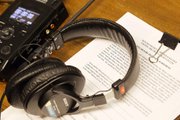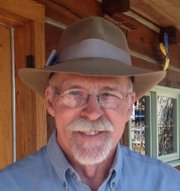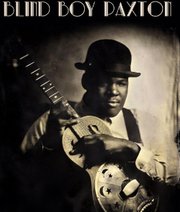Two radio programs with Arkansas music, talk and culture debuted in January with the idea of using an old medium to reach new ears.
Ozark Highlands Radio, produced at the Ozark Folk Center State Park in Mountain View, debuted Jan. 8 on three public radio stations in the state. Radio CALS, produced by the Central Arkansas Library System, also began broadcasting Jan. 8, on a noncommercial radio station in Little Rock.
They're similar in some ways -- nonprofit, produced by a public entity -- and dissimilar in others, but the goals are the same: to entertain, educate and entice.
HEY, GRANDPA,
WHAT'S FOR SUPPER?
Ozark Highlands Radio can be heard at three times in three places and downloaded anytime from two places: KUAR-FM, 89.1 in Little Rock, 8 p.m. Fridays; KASU-FM, 91.9 in Jonesboro, 2 p.m. Saturdays; and KUAF-FM, 91.3 in Fayetteville, 3 p.m. Sundays. The shows are archived and accessible on Ozarkhighlandsradio.com, and podcasts can be downloaded from iTunes for free.
The hour-long programs are also free to the radio stations.
Daren Dortin, music director at the state park in Mountain View, is the executive producer. Content for the program comes from the folk center's nightly concerts from April to October last year. Forty original programs will be produced; reruns will be used the other 12 weeks of the year.
"We've been on the air a little over a month and had great response from all our public radio affiliates in Arkansas," Dortin said. "We've also had a wonderful response on social media. We've been tracking web usage via our SoundCloud application. We look back at page visits and we've had pretty brisk usage, more than 500 visits, but also a number of international listeners or logins."
In the past, Dortin produced Beale Street Caravan in Memphis.
"When we started putting this idea together, and having done this before, I knew it was important to have realistic goals and a timeline. We didn't want to put ourselves into a corner. When the program was launched our pie-in-the-sky goal was to have all 40 ready to go."
As of Feb. 1, "we have reached our goal by half."
Were there any surprises during production?
"Shockingly, no," Dortin said. "I fully anticipated snags, hang-ups and equipment issues. We purchased a lot of audio gear. My experience is mostly analog, but today everything is digital. I was uncertain how it would work, but that end of it went together quite well. Credit to Jeff Glover, our tech wizard."
Dortin was also encouraged by feedback from the National Public Radio affiliates in the state. "They made getting it off the ground a lot easier, gave us a soft place to launch."
Rick Stockdell, general manager at KUAF, is "tickled to have it as part of our lineup."
"I thought for a long time that the park in Mountain View had such great music and so many great musicians that it would be awesome if they had a radio program to package that music. And darned if it didn't happen. So dreams do come true."
Stockdell has Ozark Highlands Radio in his station's lineup because "it's something you can't hear anywhere else. It features what I see as a pretty important part of Arkansas culture, a good representation of the culture and history of Arkansas music. And the people putting it together know what they're doing."
In Little Rock, KUAR's general manager Ben Fry says, "It's going fine. I'm not hearing much more than social media. On Facebook people say it sounds great. Audience numbers are months away. From our perspective, the programming perspective, it's a really well-made show. The music of course is wonderful and they have great content to work with."
"A lot of the ways the show is constructed comes back to what we had advised them at some point, like where the breaks needed to go," Fry added.
Fry also praised the program's archival piece, called "From the Vault." In that segment, host Dave Smith visits with Mark Jones, a sound engineer and son of the late country musicians Grandpa and Ramona Jones.
"We knew at the beginning there was a vast wealth of material recorded at the folk center sitting relatively unused, in the sense it wasn't out in the open for public consumption or access," Dortin said. "Gosh, all this great material was collecting dust. What a great thing to feature on the program. From a producer's point of view, it's an almost endless source of material."
"The dialogue [between] Dave and Mark puts the music into context," Dortin said.
Dortin gave credit to one of the folk center's musicians, Scott Blake, for the idea of using the archival music.
A long-term goal of the radio program is to increase visits at the folk center, Dortin said.
"It's a cost-effective way to get our message out about what goes on at the park, and in Mountain View and Stone County as well. As the program continues to grow, next year we'll feature other things that go on at the park. We're really getting a big bang for our buck."
LIBRARY VOICES
KABF-FM, 88.3, in Little Rock is home to the new Radio CALS, which airs from noon to 2 p.m. Fridays and features the cornucopia of material generated by the state's largest library system and the Butler Center for Arkansas Studies. The show combines music, news of the library system and interviews conducted by its staff.
The Jan. 29 program, for instance, included:
• A conversation with David Pryor, former governor and U.S. senator.
• Selections from the Butler Center's Legacies and Lunch program.
• Information about and songs performed by Arkansas musicians with birthdays in January, such as country songwriter Melvin Endsley and blues legend Willie "Big Eyes" Smith.
• "Chewing the Fat" with Rex Nelson and Paul Austin. Nelson is director of corporate communications for Simmons First National Corp. Austin is executive director of the Arkansas Humanities Council.
• An interview with David Ware, author of the recently published book It's Official! The Real Stories Behind Arkansas' State Symbols.
That's a lot of programming. But two hours is a lot of radio, as Wade Rathke knows. He's the station manager at KABF.
"We had a two-hour block, and this is perfect for lunchtime on Friday," he said. "I told CALS this would be a great time for them, but be careful. Two hours is a long time. But they have embraced the show."
Great minds came together at the right time to make this collaboration happen.
When he learned library system Director Bobby Roberts planned to retire, Rathke decided "let's talk to Brother Roberts and see if they're interested in doing a serious show. We went to them on our knees, and at the same time they also over the years had thought about radio. It was one of those things where you get lucky."
Luck is the residue of design, and the design was turned over to David Stricklin and Glenn Whaley of the Butler Center, and Lee Ann Hoskyn of the library system. But first the library board voted Dec. 10, Stricklin said, to do the deal with KABF. The deal is a five-year contract, $20,000 a year to be paid to KABF. Stricklin said the money comes from the library's endowment fund. The library system does all producing, editing and content selection, Stricklin said.
Why radio?
"It's a new way to tell stories," Whaley said. "Not words on paper, but audio."
"It's really a natural extension of what the library system does and why it exists -- for people's entertainment and well-being," Stricklin said. "Just about everybody can get close to a radio. This opens CALS to a population that might have been under-reached."
KABF has plenty of reach. The station has been on the air for 31 years and has about 50,000 listeners weekly. Rathke said it's one of 12 noncommercial radio stations in the country with 100,000 watts of power.
The Butler Center has a recording studio and "techie people," Stricklin said, who create and edit the two-hour program, "a whole lot of little pieces and big pieces." Technology allows the completed program to be delivered electronically to the radio station for broadcast. The program may also be streamed live at kabf.org, or accessed anytime at soundcloud.com/radiocals.
Rathke hopes the program lasts way beyond five years.
"We have a partnership we're so proud of," he said. "It's a huge benefit for CALS, but it helps KABF as well. A lot of people know about us but there are something like 80 radio stations in central Arkansas.
"This helps us bond with an audience we want to speak to."
OH, THE HUMANITY
The first commercial radio station in the United States (KDKA in Pittsburgh) dates to 1920. Back in Mountain View, Dortin has an appreciation for the medium's enduring power.
"At its basic level it's personal and emotional," Dortin said. "If you ask anybody, it goes back to early childhood memories for a lot of folks. They grew up listening to AM or FM radio. My story is similar to your story and millions and millions of other people around the world.
"Late at night, after your parents sent you to your bedroom, all you have is this magic box where you spin the dial and you get sounds from everywhere."
Ozark Highlands Radio, Dortin said, is also an opportunity to "integrate more modern digital media in a way we were not doing in the past. I don't think the words 'Arkansas State Parks' and 'iTunes' were ever used in the same sentence before we started this.
"It's a way for us to modernize and catch up to current trends, albeit with one of the oldest forms of broadcast media.
"Think of all the changes in technology, and radio still survives."
Style on 02/14/2016
